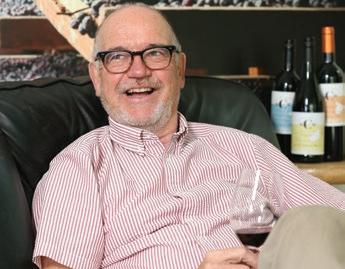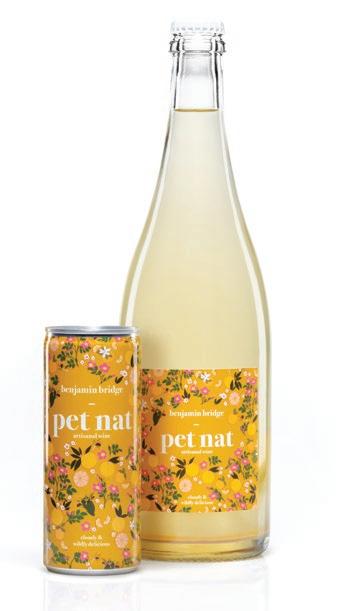
3 minute read
Wine: Why biodiversity matters
Wine-growing practices being rewritten
Some producers are moving beyond their usual systems into a new realm of wine-making and farming.
Advertisement
Tristan BragagliaMurdock
The wine grape is as fickle as agricultural products come. Centuries of documentation has helped to determine the ideal soil structures, sun coverage and vine placements on the properly angled hillsides of historic regions, affecting the quality and pricing of wines. With shifting weather patterns, this is increasingly no longer true.
Extreme weather events are becoming more common. Wine grapes of quality, often tied to the notion of terroir, face the consequences of these changes. To call wine-making in the midst of the climate crisis a challenge would be an understatement.
In trying to adhere to nature’s desire rather than seeking complete control through chemical sprays, producers are looking to new, unrealized regions and implementing new varietals into regions already entrenched in wine production. Reactive measures alone cannot stand up to the changing climate.
Rather, conscious producers are looking to better the health of their vineland by implementing plant and biodiversity and viewing the farmland as an ecosystem. Keeping the soil happy and lively in turn keeps the vines happy and productive. Organic and biodynamic certifications on wine labels, alongside the popularity of the natural wine movement, has showcased the importance of sustainability to the consumer market.
Sustainably speaking, packaging is a quick fix. Glass bottles shipped around the globe do us no favours. According to Scientific American, “almost half the weight of an ordinary case of wine comes from the bottles; about 95 per cent of the weight of a case of boxed wine is the wine itself.”
Campbell Kind Wine is an international brand made up of environmentally conscious producers, some of whom are based in Italy, shown here.
When you're shopping for international wine, cans, plastic bottles or boxes are ideal. Granted, there aren’t many qualitydriven options presently, but the trend is growing — slowly. The agency called The Living Vine imports an Italian Primitivo (also known as Zinfandel in California) in five-litre bag-in-boxes, making for a stellar, dark, fruit-forward and purple-hued

Campbell Kind Wine is the brainchild of Steven Campbell (shown here), owner of Liffort Wine & Spirits. house wine, all the while farming biodynamically and respecting the vineyards.
Campbell Kind Wine is the brainchild of Steven Campbell, owner of Lifford Wine & Spirits. Launching an international brand and teaming up with environmentally conscious producers, Campbell aims to move Lifford beyond its present status as carbon-neutral by reducing its footprint even further. To do this, he measures the climate impact of his wines, offsetting their impact through tree-planting in conjunction with Tree Canada. Working with producers from Spain, Italy, California, New Zealand, Australia and South Africa has ensured there’s a style of wine at an affordable price for everyone shopping at the LCBO.
On the East Coast, Nova Scotia has made waves with sparkling wines of all sorts. Benjamin Bridge’s mineral-driven Champagne-like bubbles raise eyebrows until they’ve been tasted. The winery’s online shop offers canned versions of both its naturally sparkling Pet-Nat, a light and fresh sipper meant for lounging in the sun,

Nova Scotia winery Benjamin Bridge has been canning its popular Nova 7 and sparkling PetNat to make them more sustainable.
and Nova 7, a definitive mimosa replacement boasting tangerine and passion fruit flavours and low-alcohol, at just 6.5 per cent. They’re the ideal picnic pairing: low alcohol, food friendly, easy to transport and even easier to recycle.
If we want to keep enjoying wines from producers we admire and from the regions we revere, we should consider the impact we can make by supporting those whose values we admire.
Lunaria Orsogna’s Primitivo comes in a convenient five-litre bag-in-a-box design. Pouring through the spout protects the wine inside from oxidation for a longer period of time. The box costs $84.95 and is available through www.thelivingvine. ca in a four pack. It’s ideal for upcoming BBQs, roast vegetable dishes and woodfired pizza.
Campbell Kind Wines are now available at the LCBO. The three available products are all under $20 and include a New Zealand Sauvignon Blanc, a South African Syrah and a Spanish red blend, with more offerings to come.
Benjamin Bridge can be purchased online through www.benjaminbridge.com.
Tristan Bragaglia-Murdock writes on all things alcohol, is co-owner of Union 613 and Jabberwocky bars and works for Revel Cider and iBi Wines.











